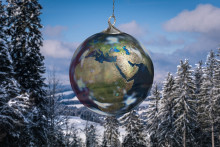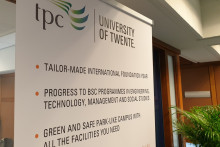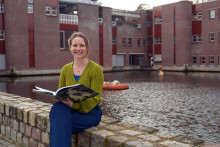‘Latvian Christmas begins early - on the 24th of December, when the family gets dressed in their warmest clothes, takes an axe with them and goes to a nearby forest to pick up a Christmas tree, which is legally allowed by the Latvian Forest Agency. Once the best tree is chosen and decorated, the youngest members of the family bake some gingerbread cookies to put on the table later, but most importantly to spread the Christmas scent in the house. In my family we celebrate Christmas together with the extended family at my aunt’s home. The tradition is to have at least nine meals on the dinner table, which also includes my favorite - cooked grey peas with bacon sauce. After dinner, we play some games together before exchanging presents. This year we are keeping the tradition of being together, but slightly changing the setting by going on a family vacation to Budapest and celebrating Christmas in Hungarian style.’
an axe with them and goes to a nearby forest to pick up a Christmas tree, which is legally allowed by the Latvian Forest Agency. Once the best tree is chosen and decorated, the youngest members of the family bake some gingerbread cookies to put on the table later, but most importantly to spread the Christmas scent in the house. In my family we celebrate Christmas together with the extended family at my aunt’s home. The tradition is to have at least nine meals on the dinner table, which also includes my favorite - cooked grey peas with bacon sauce. After dinner, we play some games together before exchanging presents. This year we are keeping the tradition of being together, but slightly changing the setting by going on a family vacation to Budapest and celebrating Christmas in Hungarian style.’
‘For almost everyone in Kenya, Christmas is a time to gather with friends and family, go to church and enjoy a big fest where all types of food prepared. Many people travel from cities back to the villages, where the main part of the family lives. This is how my experience has been so far growing up, and especially living far from my parents since my bachelor studies. One interesting thing about Christmas for me growing up is that Christmas trees have never been part of it. I would say for most families in Africa that’s the case, where most of us have grown to see it in malls, like in the picture, for instance. However, now it’s a culture being embraced in most homes. This year, I’m planning to travel with some friends to Prague for the Christmas holidays. This is my first time studying and living in Europe, so I would like to explore Christmas traditions of other countries.’
where all types of food prepared. Many people travel from cities back to the villages, where the main part of the family lives. This is how my experience has been so far growing up, and especially living far from my parents since my bachelor studies. One interesting thing about Christmas for me growing up is that Christmas trees have never been part of it. I would say for most families in Africa that’s the case, where most of us have grown to see it in malls, like in the picture, for instance. However, now it’s a culture being embraced in most homes. This year, I’m planning to travel with some friends to Prague for the Christmas holidays. This is my first time studying and living in Europe, so I would like to explore Christmas traditions of other countries.’
‘Being a country on the equator, Christmas in Malaysia usually happens in sweltering heat. For me, Christmas mornings start off with dressing in our best clothes, which would usually be the festive red, green, and white colors. Then we get together to have a quick little breakfast - fresh tiny banana muffins, that my mum makes. Being Christian, we go to a church service in the mornings. After that, we have lunch with my grandparents at a restaurant, as my mother likes bringing my grandparents out for a treat to take a break from the cooking they usually do. For many, receiving presents might be the best part of Christmas, but I’m usually most excited for Christmas dinners. My mom, my grandmother and my aunts get together to prepare a feast. The dishes are never the same, and we usually have at least eight on the table. After dinner, we take turns sharing what we were grateful for throughout the year. For the last two years, I have not been spending Christmas at home. This year will most likely be the same and I will be spending Christmas in the Netherlands with some friends and their families instead.’
start off with dressing in our best clothes, which would usually be the festive red, green, and white colors. Then we get together to have a quick little breakfast - fresh tiny banana muffins, that my mum makes. Being Christian, we go to a church service in the mornings. After that, we have lunch with my grandparents at a restaurant, as my mother likes bringing my grandparents out for a treat to take a break from the cooking they usually do. For many, receiving presents might be the best part of Christmas, but I’m usually most excited for Christmas dinners. My mom, my grandmother and my aunts get together to prepare a feast. The dishes are never the same, and we usually have at least eight on the table. After dinner, we take turns sharing what we were grateful for throughout the year. For the last two years, I have not been spending Christmas at home. This year will most likely be the same and I will be spending Christmas in the Netherlands with some friends and their families instead.’
‘In Azerbaijan, we begin Christmas preparations by decorating the Christmas tree, or ‘volka’. In our family, this is initiated by my mom and elder sister. We have a famous market called “Soyuq əllər, isti ürəklər” which literally means “Cold hands, warm hearts”. This is special since a portion of money that is made is donated to charity funds across the country. You can also encounter Santa Claus and Sniquruchka or “snow girl” while walking through the city center (pictured here, ed.). Family gathering around the table usually happens on New Year’s Eve. Some of the unavoidable dishes include “capital salad”, which is similar to Russian salad and ‘yarpaq dolmasi’ or stuffed grape leaves. At midnight, sabering the champagne is a common tradition, and as a child, I was always scared that we would break something. We also have some superstitions: You are not supposed to sleep before midnight on New Year’s Eve; otherwise, you will probably spend the next five to seven years mostly sleeping. If you spend New Year away from home, it is believed that you will spend it away for the next seven years as well. It’s funny that I will be away from home this year and will be traveling to Paris.’
tree, or ‘volka’. In our family, this is initiated by my mom and elder sister. We have a famous market called “Soyuq əllər, isti ürəklər” which literally means “Cold hands, warm hearts”. This is special since a portion of money that is made is donated to charity funds across the country. You can also encounter Santa Claus and Sniquruchka or “snow girl” while walking through the city center (pictured here, ed.). Family gathering around the table usually happens on New Year’s Eve. Some of the unavoidable dishes include “capital salad”, which is similar to Russian salad and ‘yarpaq dolmasi’ or stuffed grape leaves. At midnight, sabering the champagne is a common tradition, and as a child, I was always scared that we would break something. We also have some superstitions: You are not supposed to sleep before midnight on New Year’s Eve; otherwise, you will probably spend the next five to seven years mostly sleeping. If you spend New Year away from home, it is believed that you will spend it away for the next seven years as well. It’s funny that I will be away from home this year and will be traveling to Paris.’
‘We have a Christmas tradition known as ‘Novena’, a nine-day prayer cycle that begins nine days before Christmas. However, only the most religious people in the house do it. We also create a manger or a Christmas crib depicting the nativity scene. On Christmas day, all family members gather together and brings a dish each. A common New Year’s tradition is to make mache dolls of all sorts and then burn them all at midnight. This is a way of saying goodbye to the bad things of the past year. Another New Year’s tradition is ‘viudas’ or widows, where widowed women of the old year or men dressed in feminine attire take to the streets to ask for money (pictured here, ed.). We also have other superstitions such as wearing red underwear for love and eating grapes for good luck. This year, I will be celebrating the holidays in the Netherlands with my boyfriend and his family.’
However, only the most religious people in the house do it. We also create a manger or a Christmas crib depicting the nativity scene. On Christmas day, all family members gather together and brings a dish each. A common New Year’s tradition is to make mache dolls of all sorts and then burn them all at midnight. This is a way of saying goodbye to the bad things of the past year. Another New Year’s tradition is ‘viudas’ or widows, where widowed women of the old year or men dressed in feminine attire take to the streets to ask for money (pictured here, ed.). We also have other superstitions such as wearing red underwear for love and eating grapes for good luck. This year, I will be celebrating the holidays in the Netherlands with my boyfriend and his family.’








